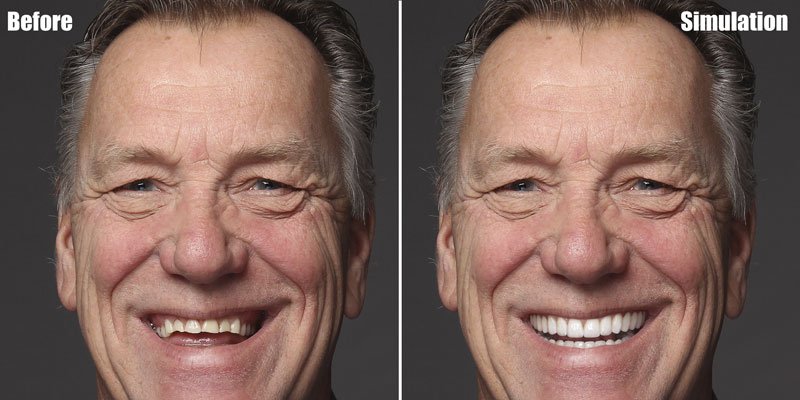Joanne Villani, RDH, describes how digital smile simulation can shift patients’ focus and increase case acceptance.

Joanne Villani, RDH, discusses motivators for case acceptance
In full-arch dentistry, where treatments like implant-retained dentures (AOX) carry significant costs, understanding patient psychology is vital. These treatments represent more than clinical solutions — they’re transformative investments in self-confidence, emotional well-being, and quality of life. Therefore, addressing emotional motivators as well as psychological barriers, particularly through visualization, is essential to gaining case acceptance.
Patients buy smiles, not teeth
Dan Ariely, a behavioral researcher, explains in his book Predictably Irrational that emotions often lead people to overvalue outcomes that meet psychological needs, a concept relevant in healthcare and esthetic treatments, where patients equate procedures with enhanced self-esteem and quality of life.
Research from Psychology Today underscores the powerful impact of visuals in decision-making, highlighting that imagery capable of evoking strong emotional responses can dramatically increase the likelihood of a positive decision. This is particularly relevant in contexts where individuals struggle to fully envision outcomes, such as transformative dental treatments. Visuals serve as a bridge between abstract possibilities and tangible realities. Visuals not only clarify complex information but also inspire patients to take action with greater confidence and conviction.
Digital smile simulations
In full-arch dentistry, the promise of a functional beautiful smile — and the confidence, freedom, and improved social interactions it brings — can become the driving force behind case acceptance. However, many patients hesitate because they cannot fully imagine how transformative the results will be or how dramatically their appearance could change.
This gap in imagination is where digital smile simulations become invaluable.
Simulations allow patients to visualize their transformation and connect with the life-changing potential of treatment. Visualizing their potential transformation often triggers the “yes” moment.
Overcoming hesitation over cost
“Patients need to see the transformation before they can believe in it,” explains Dr. Christian Yaste, author of the book A Smile Where There Was None: A Practical Approach to Fixed Full-Arch Implant Dentistry. “Digital tools like PreVu® help patients envision their future. Being able to present a smile preview is an essential part of the consultation process.”
Simulations help patients shift their focus from cost to the emotional and esthetic benefits, which are often the most compelling factors in their decision. Without this visual aid, patients may struggle to appreciate the life-changing potential of full-arch rehabilitation, leaving them to decline or delay treatment.
A competitive edge
In a competitive market, where patients often seek multiple consultations, practices must differentiate themselves by offering a superior patient experience. Digital smile simulations not only improve case acceptance rates but also demonstrate a patient-centered approach that fosters loyalty and trust.
“High-quality visuals give patients clarity and build trust,” says PJ Jafari, CEO of 10X Dental Partners, a consulting firm specializing in optimizing full-arch dental practices. “When paired with effective communication, treatment simulations help patients feel confident in the practice and in moving forward with treatment.”
What to look for in smile simulation software
Smile simulation software should offer quick, easy-to-use features that can be delegated to the dental team. The simulations must look natural, not overly digitized, to resonate with patients. The software should allow for viewing of simulations on a large screen during consultations, which creates a dramatic “big reveal” moment, and for the ability to print, email, or text those simulations, keeping the benefits of treatment top of mind. This flexibility ensures patients can share the simulations with co-decision makers and receive support from friends or family, increasing confidence in their decision to proceed with treatment.
Conclusion
Patients deciding on full-arch rehabilitation are not merely buying teeth — they’re investing in a life-changing transformation. By tapping into emotional drivers, leveraging digital smile simulations, and fostering trust, dental practices can guide patients toward saying “yes” to treatments that will profoundly improve their lives.
Read about how digital smile simulation helped Dr. David Salmassy’s patient to preview her new smile in “Immediate implant placement and reestablishing vertical dimension,” here: https://implantpracticeus.com/immediate-implant-placement-and-reestablishing-vertical-dimension/
Stay Relevant With Implant Practice US
Join our email list for CE courses and webinars, articles and mores

 Joanne Villani, RDH, co-founder of PreVu Software, has over 35 years of dental expertise, including leadership roles in sales and marketing. She is dedicated to helping dental practices grow by increasing case acceptance for cosmetic, restorative, and reconstructive treatments, driven by her belief that everyone deserves a smile they feel confident about. Learn more at
Joanne Villani, RDH, co-founder of PreVu Software, has over 35 years of dental expertise, including leadership roles in sales and marketing. She is dedicated to helping dental practices grow by increasing case acceptance for cosmetic, restorative, and reconstructive treatments, driven by her belief that everyone deserves a smile they feel confident about. Learn more at 

